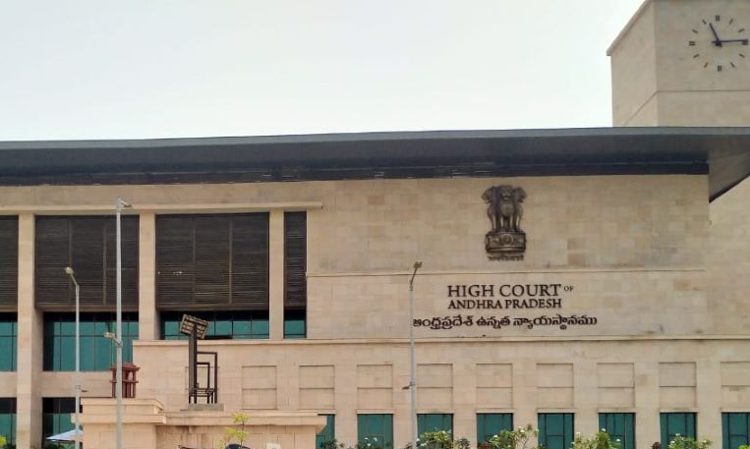- Home
- /
- High Courts
- /
- Andhra Pradesh High Court
- /
- "Unknown To Criminal...
"Unknown To Criminal Jurisprudence": Andhra Pradesh HC Sets Aside Order Permitting Prosecution To Frame, Alter Charges U/S 216 CrPC
Saahas Arora
7 April 2025 11:30 AM IST
The Andhra Pradesh High Court has held that the legislative intent behind enacting Section 216 of CrPC is only to ensure that the Court retains the exclusive power to alter or add a charge depending upon the evidence placed before it and subsequently ensure that the accused is notified of the same.Justice Harinath N explained that Section 216 does not give scope to either the prosecution or...
The Andhra Pradesh High Court has held that the legislative intent behind enacting Section 216 of CrPC is only to ensure that the Court retains the exclusive power to alter or add a charge depending upon the evidence placed before it and subsequently ensure that the accused is notified of the same.
Justice Harinath N explained that Section 216 does not give scope to either the prosecution or the accused to seek alteration or addition of a charge by filing an application before the Court to invoke the provisions of Section 216 of CrPC. In this regard, it further held,
“If the power under Section 216 of Cr.P.C., is to be invoked by the Court thus there is no scope for filing a petition under Section 216 Cr.P.C., either by the prosecution or on behalf of the accused. If Section 216 Cr.P.C., is invoked by the prosecution or the accused there cannot be an end for any trial before any Court. If the parties to a litigation are allowed to invoke Section 216 of Cr.P.C., the very purpose of incorporating Section 216 Cr.P.C., in the Code would be defeated. If the parties misuse it, it would delay the conclusion of the trial, and the same would be beyond the scope of the Court to conclude any trial in any case.”
Background
The Court was hearing a Criminal Petition challenging an order passed by the the VI Additional District and Sessions Judge–Cum–Special Judge for Trial of Offences against Women at Chittoor (“impugned order”), whereby the Sessions Judge had allowed a petition filed by the prosecution under Section 216 of CrPC and reframed charges against the petitioner/accused. Pursuant to this, the petitioner was charged under Sections 120-B, 302 and 307 read with 149 of the Indian Penal Code.
It was the case of the petitioner that under Section 216 CrPC, the Court is bestowed with the exclusive power to alter any charge and that there could not have been an occasion for the investigating officer (IO) to file a petition seeking alternation of charge, as was done in the present case. The alteration was argued to be filed at a very belated stage after examination of as many as 56 witnesses and was prayed to be held unsustainable in law.
Contrary to this, the respondents had argued that the impugned order can be challenged under revision and not under Section 482 of CrPC [section 528 of BNSS]. Additionally, it was submitted that the impugned order was justified as the purpose of prosecuting a criminal case against an accused is to frame charges accurately for the offences in accordance with the evidence and doing so would only promote justice and fairness in the trial. It was further argued that it is immaterial whether the IO had filed a petition seeking alteration as the Judge can treat the petition as information for altering the charge and no prejudice shall be caused to the accused in this process.
Findings
Section 216 deals with the process of altering charge whereby exclusive power is granted to the Courts to alter or add a charge and no party is required to file a petition to invoke its powers under Section 216.
The Court held that it was surprising to note that the IO had altered/framed the charges, a task which lies within the sole domain of the Court. Allowing the criminal petition and setting aside the impugned order, the Court held,
“The proposed altered charges are incorporated in the petition filed by the investigating officer. It is equally surprising to note that the learned Sessions Judge had altered the charges as suggested by the prosecution in their petition filed under Section 216 Cr.P.C., in toto. Such a procedure is unknown to criminal jurisprudence. On these grounds, the order passed by the learned VI Additional District and Sessions Judge-Cum-Special Judge for Trial of Offences against Women, Chittoor deserves to be set aside, and accordingly, the order passed in Crl.MP.No.308 of 2025 in S.C.No.110 of 2016 is hereby set aside.”
Case Number: CRIMINAL PETITION No.3424 OF 2025
Case Title: Sriram Chandra Sekhar @ Chintu v. The State of Andhra Pradesh
Date: 04.04.2025



